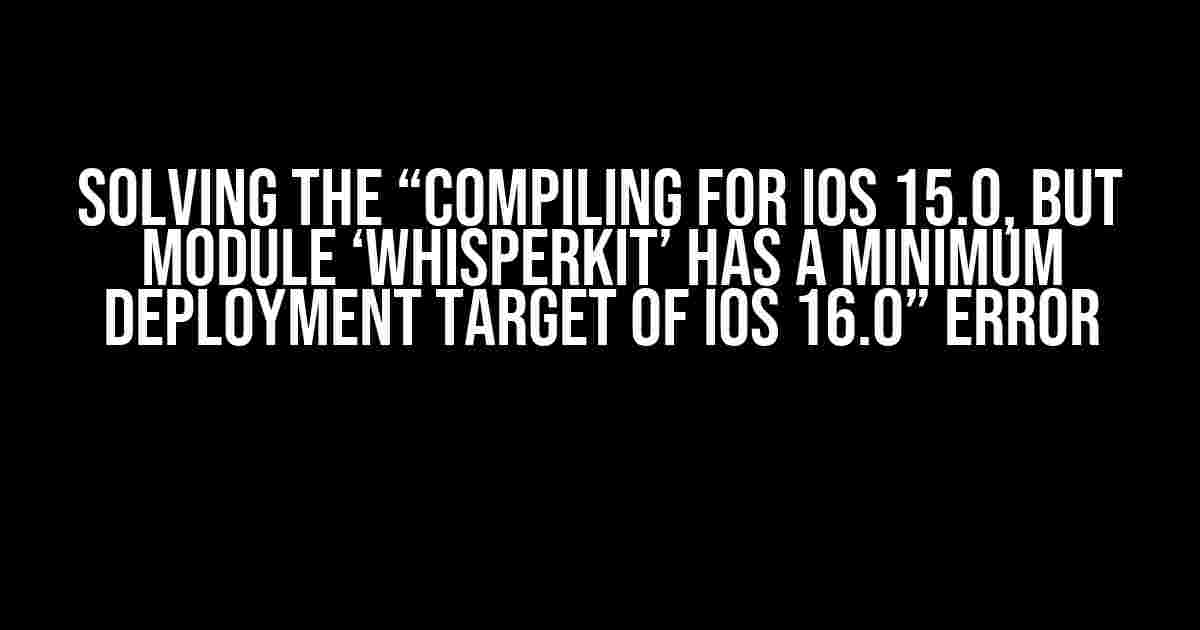Are you tired of running into the frustrating “Compiling for iOS 15.0, but module ‘WhisperKit’ has a minimum deployment target of iOS 16.0” error when trying to build your iOS app? You’re not alone! This pesky error has been plaguing developers for far too long, but fear not, dear reader, for we’re about to dive into the solutions to get you back on track in no time.
What’s causing the error?
Before we dive into the fixes, it’s essential to understand what’s causing this error in the first place. The WhisperKit module, a popular Speech Recognition framework, has a minimum deployment target of iOS 16.0. This means that if you’re trying to compile your app for an earlier version of iOS, such as 15.0, the compiler will throw an error.
Why is this happening?
There are a few reasons why you might be encountering this error:
- Outdated WhisperKit version: If you’re using an older version of WhisperKit, it might not support your target iOS version.
- Incompatible Xcode version: Ensure you’re using a compatible version of Xcode that supports your target iOS version.
- Incorrect project settings: Double-check your project settings to ensure that the deployment target is correctly set.
Solution 1: Update WhisperKit to the latest version
The simplest solution is to update WhisperKit to the latest version, which might support your target iOS version. Follow these steps:
- Open your terminal and navigate to your project’s directory.
- Run the following command to update WhisperKit:
pod update WhisperKit - Once the update is complete, open your Xcode project and clean the build folder by pressing
Command + Shift + K. - Build and run your app again to see if the error persists.
Solution 2: Downgrade WhisperKit to a compatible version
If updating WhisperKit doesn’t work, you might need to downgrade to a compatible version that supports your target iOS version. Follow these steps:
- Open your Podfile and specify a compatible version of WhisperKit, for example:
pod 'WhisperKit', '2.5.0' - Run the following command to install the specified version:
pod install - Open your Xcode project and clean the build folder by pressing
Command + Shift + K. - Build and run your app again to see if the error persists.
Solution 3: Adjust your project settings
In some cases, the error might be due to incorrect project settings. Follow these steps to adjust your project settings:
- Open your Xcode project and navigate to the target settings.
- Click on the “General” tab and ensure that the “Deployment Info” section is set to your target iOS version.
- In the “Build Settings” tab, search for “iOS Deployment Target” and set it to your target iOS version.
- Clean the build folder by pressing
Command + Shift + K. - Build and run your app again to see if the error persists.
Solution 4: Use a different Speech Recognition framework
If none of the above solutions work, you might need to consider using a different Speech Recognition framework that supports your target iOS version. Here are a few alternatives:
| Framework | Supported iOS Version |
|---|---|
| Apple’s Speech Framework | iOS 10.0+ |
| Google Cloud Speech-to-Text | iOS 9.0+ |
| Mozilla’s DeepSpeech | iOS 11.0+ |
Conclusion
In conclusion, the “Compiling for iOS 15.0, but module ‘WhisperKit’ has a minimum deployment target of iOS 16.0” error is a common issue that can be solved by updating or downgrading WhisperKit, adjusting project settings, or using a different Speech Recognition framework. By following the steps outlined in this article, you should be able to resolve the error and get your app building and running smoothly.
Remember, if you're still encountering issues, try cleaning the build folder, restarting Xcode, and even reinstalling the WhisperKit pod. Sometimes, a simple reboot can work wonders!
Happy coding, and may the forces of iOS development be with you!
Frequently Asked Question
Get the inside scoop on resolving the “Compiling for iOS 15.0, but module ‘WhisperKit’ has a minimum deployment target of iOS 16.0” issue!
What does the error message “Compiling for iOS 15.0, but module ‘WhisperKit’ has a minimum deployment target of iOS 16.0” mean?
This error occurs when you’re trying to use a Swift package or framework (in this case, WhisperKit) that has a minimum deployment target of iOS 16.0, but your project’s target deployment is set to iOS 15.0. It means the module isn’t compatible with your project’s current deployment target.
Why does WhisperKit have a minimum deployment target of iOS 16.0?
WhisperKit, or any other Swift package, might have a higher minimum deployment target due to its dependence on newer iOS features, APIs, or Swift language versions that aren’t available in older iOS versions. It’s the package author’s way of ensuring compatibility and preventing potential issues.
How can I fix the “Compiling for iOS 15.0, but module ‘WhisperKit’ has a minimum deployment target of iOS 16.0” error?
You have two options: either update your project’s target deployment to iOS 16.0 or higher, or find an alternative Swift package that’s compatible with iOS 15.0. If you’re not ready to update your deployment target, you can explore other packages that offer similar functionality.
What are the consequences of updating my project’s target deployment to iOS 16.0?
By updating your project’s target deployment to iOS 16.0, you’ll ensure compatibility with WhisperKit and other modules that require iOS 16.0 or higher. However, this change might break compatibility with older iOS devices and versions. Make sure to test your app thoroughly to avoid any potential issues.
Can I use an older version of WhisperKit that’s compatible with iOS 15.0?
Possibly! You can try to use an older version of WhisperKit that’s compatible with iOS 15.0. Check the package’s documentation or GitHub releases for previous versions that might work with your project’s deployment target. Keep in mind that older versions might not receive updates or support, so proceed with caution.
